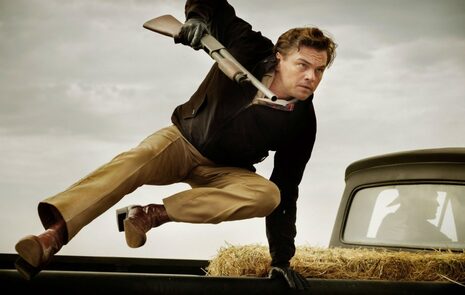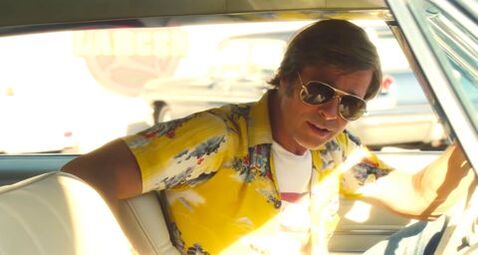B+ | A washed-up actor, his stuntman, a rising star, and barefoot hippies collide in 1969 Hollywood. Directed by Quentin Tarantino Starring Leonardo DiCaprio, Brad Pitt, and Margot Robbie Review by Jon Kissel |


For anyone cursorily familiar with the time period and the names of the people involved, Tarantino’s choice to set his latest film when he does marks this as his third period piece following Basterds and Django Unchained. That trio provides a peek into his idiosyncratic mind, where the director enacts revisionist revenge on Hitler, Southern plantation owners, and Charles Manson’s acolytes. Two of those are societal crimes on a massive scale, and the other, while tragic, is not that. For Tarantino, however, the Manson murders must form some kind of hinge that the world folded upon, where if those cult murders were prevented, things might have been different. I’m no scholar of the period, and my only thought towards Manson fallout revolve around Polanski’s eventual sex crimes and a tossed-off line in Inherent Vice about it being illegal for four hippies to ride in a car together. Considering that 1969 sat at the beginning of the New Hollywood era, widely considered a fertile time for dozens of auteurs churning out generational work unimpeded by gruesome murders, I’m even further away from counterfactuals.
If I can’t fully square the implicit comparison of Manson to Nazi’s and slavery, I can fully admit that the film takes great care to consider the human impact of August 9, 1969. Robbie’s Sharon Tate has generated various articles and clickbait about how few lines she has throughout the course of the film, but that doesn’t mean she’s not a character fully inhabiting the world. Robbie beams hope and joy in her several scenes, a person on top of the world and awestruck to be there. She goes to fun parties and dances with abandon, and she revels in her burgeoning career as an actress, not out of a sense of conformation of her greatness but in a genuine appreciation of the people who helped her along the way and the moviegoers who get enjoyment out of her work. When Tarantino includes footage from Tate’s The Wrecking Crew, he noticeably doesn’t swap out Robbie’s likeness for Tate’s, a fourth-wall break that supplements the tragedy undergirding the film. Tarantino has idealized female characters before in his work, particularly Alabama in True Romance, but the elevation of Tate feels earned, even appropriate, and Robbie does the vital work of embodying a presence that the world was worse off without.
Once Upon a Time in Hollywood isn’t a dedicated counterfactual about Tate and Manson, though. That thread occupies one corner of a large world, and in another is Dalton, a character plagued with all the neediness that Tate seems to lack. No matter how bad his day’s going, Dalton can always look forward to the moment he pulls up to his driveway and parks his car in front of his snarling visage, blown up off of a movie poster. Which is to say, Cliff pulls up and parks, as Dalton has lost his license after too many DUI’s. DiCaprio made grocery store tabloid headlines for his supposed dad bod, and he leans into the perception of having let himself go here, all hacking and snot rockets and public tears. With his stutter that he struggles mightily to cover up, Dalton may once have shared Tate’s giddy disbelief that he’s in this place, but after a few decades, he’s ready to throw in the towel. DiCaprio generates most of the comic relief, and as we all realized in Wolf of Wall Street, he can be a brilliant comedian when he’s not eating a raw fish and shivering in the Canadian tundra.
Along with the laughs he generates, Dalton is also the source of much of the film’s pathos. Tarantino probably sees plenty of himself in Rick Dalton, or at least worries about winding up like him. The director has talked at length about how so many of his peers lose their fastball as they age and start cranking out subpar material, a fate he’s worried about if he’s willing to talk about it publicly. After being active for almost 30 years, there’s still no sign of decay. The knock on Tarantino compared to his 90’s independent-minded peers is that he hasn’t matured his style in the way that someone like Paul Thomas Anderson has. Dalton provides Tarantino with some pushback to that notion. This film contains Tarantino’s long, accumulatory dialogue scenes, but here he builds to emotional breakthroughs instead of violent outbursts, notably in one of the film’s best scenes. Dalton’s latest gig as another one-off villain in a Western serial finds him opposite a child actor (Julia Butters), a person far more serious than Dalton despite their vast age difference. In an eruption of vulnerability, Dalton unburdens himself to her, telling her about the doubts of the protagonist of the dime-store novel he’s reading, a nod to Tarantino’s own fears of obsolescence and his penchant for mining diamonds out of material perceived as beneath critical standards. The young actor immediately recognizes that Dalton’s talking about himself and takes this as an opportunity to practice her skills, propping up a fellow actor with encouragement which in turn gives her the chance to be in a great scene when the cameras are rolling on them both. There’s a lot to admire in a director opening his veins through his work, especially one with a reputation for detached cool.

Booth links Dalton’s emotional journey with Tate’s historical revisionist one. It’s Booth who runs into the Manson clan, though Charlie himself (Justified Dewey Crowe, Damon Herriman) has one scene that is itself a stunner of foreboding. The effervescent Pussycat (Margaret Qualley) keeps running into Booth, until he finally agrees to give her a ride out to her ‘family’s’ home, the infamous Spahn ranch where Manson’s devotees camped out. This entire sequence is incredible, and provides the first taste of righteous violence that will eventually explode into the bloody buffet of the finale. Booth’s interactions with Squeaky Fromme (Dakota Fanning), Gypsy (Lena Dunham), and the rest of these desperate cultists are chilling as they provide a look into the evil fog that settled over Tarantino’s vision of Hollywood and subtextually changed the landscape forever, a fog so thick that even Booth’s shining blond visage couldn’t break through it.
Whatever my historically-ignorant grand ideas of Once Upon a Time in Hollywood are, the truth is that the film is blast no matter how much or how little is read into it. Tarantino’s films are frequently hang out sessions, dating back to that opening diner conversation in Reservoir Dogs, and for large chunks of this one, that easy rapport between characters reigns. If the eventual Blu-ray release of this film doesn’t contain a commentary track of DiCaprio and Pitt in character, offering the same amount of languid back-and-forth as they do over a tape of one of Dalton’s many gigs, then the world will have lost something. One gets the feeling, too, that with so many name actors in bit parts, there’s a huge amount of footage that was left out, all of which I would gleefully watch. It’s no surprise that Tarantino assembles a superb soundtrack of mid-century bangers, most of which I’ve never heard before and all of which augment the scenes they’re featured in. Once Upon a Time in Hollywood isn’t Tarantino’s greatest work. For me, it’s comfortably in his bottom half, but that’s no damning flaw. The man’s out of his mind if he thinks that he’ll be incapable of this kind of gleeful filmmaking in five years or twenty years. Scorsese made Wolf of Wall Street in his mid-70’s. Paul Verhoeven made Elle in his late-70’s. Dalton gets a new opportunity by the end of Once Upon a Time in Hollywood. If Tarantino can envisage that kind of happy ending for an obvious stand-in, he can surely imagine a future for himself where he keeps making great films. A-
 RSS Feed
RSS Feed